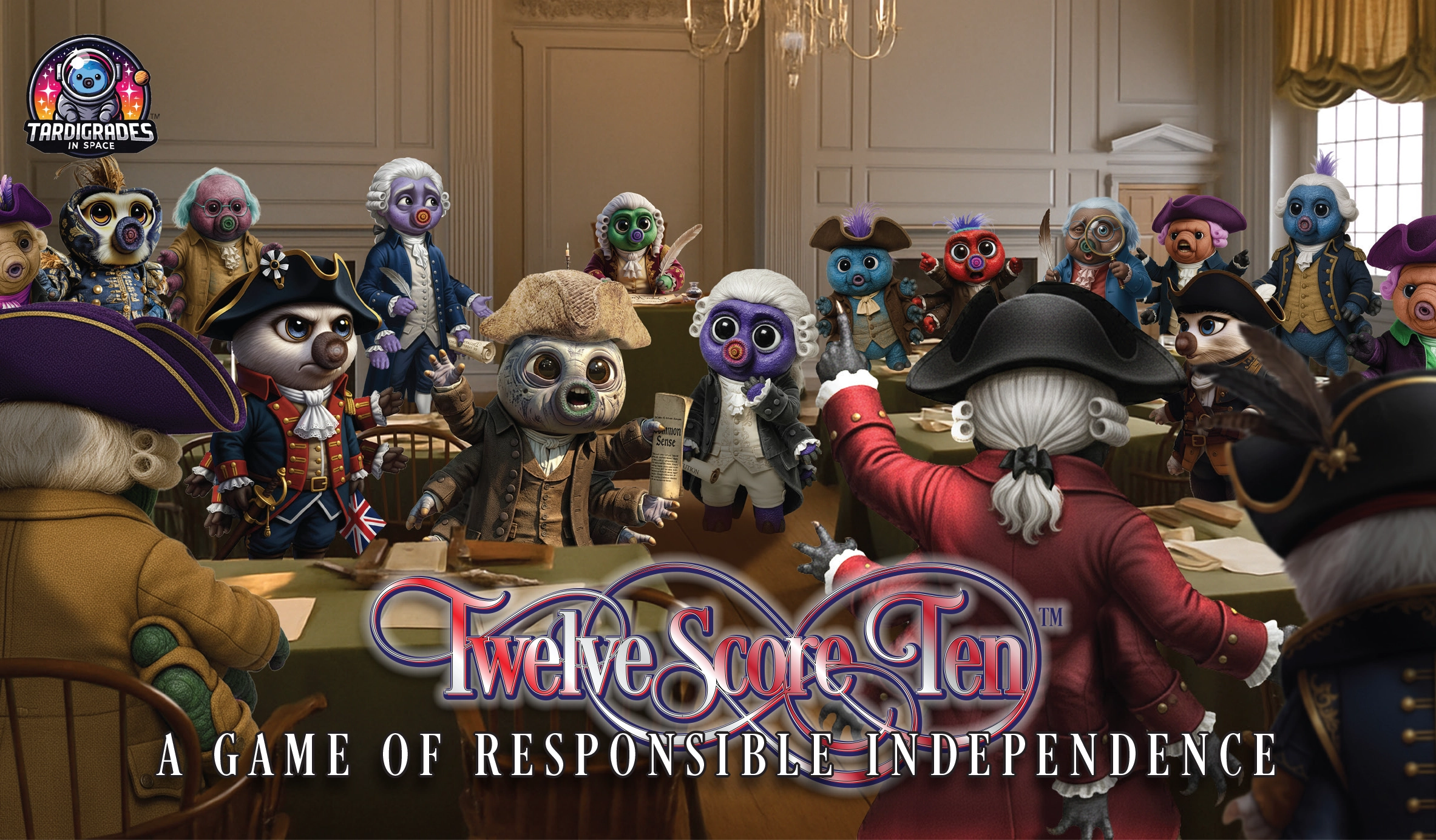


On the eve of America’s 250th anniversary, MrAnderson.Rocks presents Twelve Score Ten™—a classroom-friendly game of strategy that turns the study of independence history into an imaginative
journey of empathy, critical thinking and world-building. Blending fantasy and fact through the inspired Tardigrades in Space™ universe of artist, author and educator Jonathan Anderson, the game asks: if a new people had only human history as their guide, how would they choose to forge their own civilization?
In preparation for a Kickstarter campaign to launch the game commercially, the author is seeking teachers, game enthusiasts and after-school leaders to participate in a short-term Educator Collaborative—an informal play-testing and rule-making network to help refine gameplay, discussion prompts and lesson tie-ins for our nation’s Semiquincentennial on July 4, 2026.

Participating educators will receive:
Early prototype kits (digital or print)
Recognition in future educator editions
Deep-discounts on e-store purchases
To join the pilot or learn more, contact
MrAnderson.Rocks.
Help prepare the ‘now’ generation for responsible independence.
“Twelve Score Ten. Make History.”
Twelve Score Ten™ is a cooperative and competitive tabletop/digital experience designed to make the ideals of independence, liberty and shared destiny come alive for middle- and high-school learners. Players explore “The Founders Era” through the lens of intelligent post-lunar Tardigrades—new beings who inherit Earth and begin to reflect, refract and reform the study of human culture and history to shape their own civilization.
By blending authentic history with imaginative lore, students examine the tensions between freedom and order, innovation and tradition, individual and community—the same forces that shaped 1776 and continue to shape civic life today.
A Game of Responsible Indepence
At the heart of Twelve Score Ten is the author’s “Radical Middle” ethos— a gritty grace that encourages empathy and magnanimity over coersion and partisanship. Through role-play, introspection and dialogue, players will learn to:
Analyze primary-source events without oversimplifying or polarizing.
Identify competing world views, conflicting ambitions and geopolitical circumstances beyond players’ control.
Develop principles of diplomacy, collaboration and moral agency.
Core Design Principles
Historical Authenticity: Gameplay based on real events, tactics, troops and civilians, supply chains, geography and alliances.
Balanced Perspectives: Includes both Continental and British/Loyalist roles, plus Native allies, enslaved persons, women and civilians.
Empathy and Equity: Prompts players not only to “secure victory” but to wrestle with moral dilemmas, personal costs and divided loyalties.
Social Emotional Learning: Fosters theory of mind, social awareness, cognitive empathy, cultural intelligence and interpersonal sensitivity.
Historical Accuracy
Tactics Used: Did the player use strategies consistent with the time (e.g., line infantry, guerilla skirmishing, naval blockades)?
Role Fidelity: Did they reflect their character’s real historical position (e.g., Washington’s supply struggles, Cornwallis’s hesitations)?
Event Integration: Did they bring in actual treaties, battles, or alliances?
Scoring: Anachronistic <—> Historically grounded
(1—5 scale).
Strategic & Tactical Skill
Resource Management: How did players handle scarce food, ammo and reinforcements?
Alliance-Building: Did they successfully leverage allies (French, Native, Loyalist)?
Adaptability: Did they adjust strategy to terrain, weather, or morale conditions?
Scoring: Reckless <—> Calculated
Empathy & Perspective
Enemy Humanity: Did the player recognize that the “other side” also had motives, families and fears?
Civilian Impact: Did they consider how decisions affect local populations (burned farms, displaced families, Indigenous nations)?
Internal Conflict: Did they role-play divided loyalties (e.g., Loyalist family members, enslaved persons offered freedom by Britain)?
Scoring: Vilification <—> Humanize.
Ethical Reflection
Acknowledgement of Contradictions: Did players reflect on paradoxes (e.g., fighting for liberty while enslaving others)?
Moral Choices in Role-Play: Did they wrestle with dilemmas (burn a village for strategic gain vs. spare it for humanitarian reasons)?
Post-Game Debrief: Did they articulate lessons learned about justice, oppression or reconciliation?
Scoring: “It’s just business” <—> “Always personal.”
Diplomacy & Collaboration
Teamwork: Did players cooperate with allies and compatriots effectively?
Conflict Resolution: How did they negotiate internal disagreements?
Story-Building: Did they contribute constructively to the narrative?
Scoring: Disruptive <—> Collaborative Leaderhip.
Possible Play Cycle
Scenario Setup: Historic event (e.g., Saratoga, Valley Forge).
Role Assignment:
Player receives a role card (Washington, Hessian officer, Mohawk chief, enslaved messenger, Abigail Adams).
Objectives: Mix military and human goals (win battle and protect a family, secure supplies without burning civilian homes, etc.).
Gameplay: Tactical choices plus moral dilemmas presented via event cards or Game Master narration.
Debrief & Scoring: After the session, each player scores themselves (and peers can score too) across the five categories.
Discussion: “What did you learn about both sides of this conflict? About empathy? About freedom’s contradictions?”
Example Empathy Cards
British Player: “Troops are ordered to ‘pacify’ a village rumored to harbor rebels. Women and children flee as soldiers set torches. Do you halt the raid or follow orders?”
Continental Player: “A captured Loyalist girl begs for safe passage home. Your men demand retribution for her father’s spying. How do you respond?”
Civilian Prompt: “A courier flees into your field with secret documents. Harboring him could save lives—or cost your farm. What do you do?”